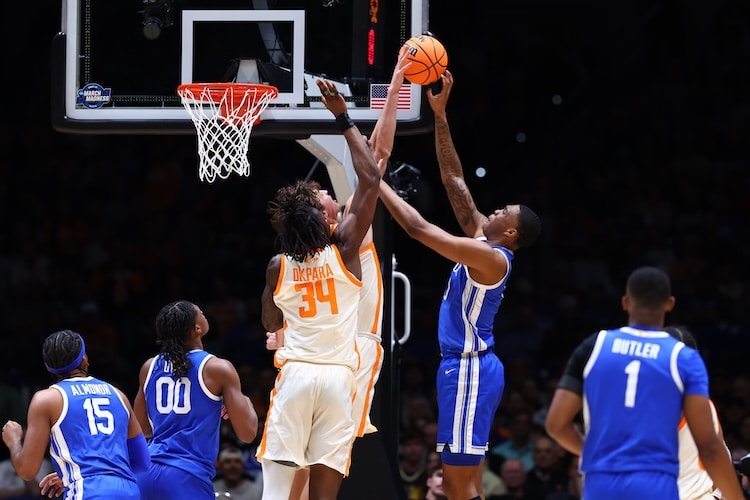
This past week, Tennessee officially added quarterback Kasim Hill to their football roster. Hill transferred from Maryland to join the Vols, and he spent his first two seasons of collegiate football as a member of Maryland’s football team. Hill was a starter for the Terrapins both seasons, but injuries derailed what looked to be a promising career with the Terps.
Now, Hill has joined the Vols and looks for a fresh start.
Hill called Tennessee head coach Jeremy Pruitt and asked if he could join the Vols as a walk-on, and Pruitt said he immediately obliged and let the third-year quarterback join his roster at UT.
“Well, he contacted us about transferring,” Pruitt said of Hill. “We only have three guys on scholarship. He’s a guy that wanted to walk on and have an opportunity to compete and participate. It’s hard to find guys that want to do that who have started games in major college football.”
While Hill will have to sit out this upcoming season, he figures to be squarely in the mix for Tennessee’s starting quarterback job in 2020 assuming Jarrett Guarantano doesn’t return for a fifth season after 2019.
Hill’s arrival sparked a lot of questions for Vol fans. What kind of quarterback is he? Should his injury history cause concern? Why did he decide to transfer when he was a two-year starter?

I spoke with Josh Stirn of 247Sports about Hill and what Vol fans should expect from the former Maryland signal caller. Stirn covers Maryland athletics for 247Sports, and he’s seen Hill play up close and in person, and he’s spoken with the Washington D.C. product over the last two years.
“At his best, he’s a big-bodied quarterback with a good arm,” Stirn said of Hill. “He’s played in big games going back to high school. He has good composure. I think he’s a better athlete than he’s given credit for, though he was a little hesitant to run last year. He didn’t seem to be in quite as good of shape as he was his freshman year.”
Hill played for St. John’s College High School and was a standout quarterback in high school. He was a four-star prospect who signed with Maryland in the 2017 class, and he made an immediate impact as a true freshman.
When Tyrrell Pigrome went down with injury on the road in Maryland’s season opener against Texas in 2017, Hill entered the game as a true freshman. The Terrapins had a 37-34 lead when Hill came into the game, and he helped Maryland pull off the upset victory. Hill completed all three of his passes for 44 yards and scored the decisive touchdown on a three-yard run with 7:36 to go in the game to put the Terps up 44-34. Maryland wound up beating Texas 51-41.
The next week, Hill started against Towson and impressed again, going 13-of-16 for 163 yards and two touchdowns and added 41 rushing yards on five carries. Hill started against UCF the following week, and he completed his first two passes of the game before he suffered a torn ACL.
Hill was sidelined the remainder of his freshman season, but he came back and was ready to play to start the 2018 season. Hill was named the starter to begin the season, and he took on the Longhorns to begin the year once again.
Just like in 2017, Hill helped lead the Terrapins to an upset victory over Texas. Hill was 17-of-29 for 222 yards and a touchdown, and he helped lead Maryland to the go-ahead touchdown at the beginning of the fourth quarter to go up 31-29. The Terps would go on to win 34-29 after a late field goal by Joseph Petrino.
But that was one of the few positives for hill in his sophomore year.
Hill would have a solid performance in late October against Illinois where he threw for a career-high 265 yards and three touchdowns in a win over the Illini, but that was largely his only other noteworthy performance of the 2018 season. Hill completed 50 percent or fewer of his passes in seven games as a sophomore, and then his season was cut short once again when he suffered another ACL injury in his other leg before Maryland’s final two games of the season.
The 6-foot-2, 234-pound quarterback finished the year with a 49.4 percent completion percentage for 1,083 yards, nine touchdowns, and four interceptions.
Did Hill rush back too quickly from his injury his freshman season? And did some of the negativity around Maryland’s program affect him, too?
“He never let it be an issue, but he definitely didn’t look like himself last year whether it was physically or mentally,” Stirn said of Hill’s injury from freshman year. “He just didn’t look like himself. He struggled most of the season, and there was also a lot of things going on around the program, obviously, with the death of Jordan McNair and DJ Durkin getting fired mid-season. I’m sure all of those played a factor.
“The offensive scheme changed last year and was a run-heavy scheme with a lot of jet sweeps. That really didn’t work in his favor in terms of throwing the ball down the field, but he definitely didn’t look like himself last year.”
Maryland was in the news a ton in 2018, and rarely was it for good reason. The program was rocked by the death of Jordan McNair, and the culture at Maryland was scrutinized and lambasted by the media. That along with lack of on-field success resulted in head coach DJ Durkin being fired on October 31st, just a day after he was reinstated from his suspension from before the season began.
There was also the fact that Matt Canada was brought in as offensive coordinator prior to the 2018 season, a change from Hill’s original offense in 2017. Canada would serve as Maryland’s interim head coach in 2018 as well, but it was clear that Canada wanted to run a different offense than what Hill originally signed on for.
Under Canada, Maryland was a more run-heavy offensive team. The Terps averaged 230.2 yards per game on the ground and ran the ball an average of 40.6 times a game. Through the air, Maryland averaged only 141.3 yards a contest while throwing the ball just 20.1 times per game.
According to Stirn, the offense was limited a bit due to Hill’s accuracy issues and what he was (and wasn’t) capable of doing. But even with Hill’s limitations in 2018, Stirn doesn’t think the offense would’ve worked for any of Maryland’s quarterbacks.
“I think they would’ve thrown more if Kasim had played better,” Stirn stated. “There were other things, too. I think he struggled going through progressions. I think his freshman year, the offense was simpler and a little more spread out and a little more fast-paced where he was kinda able to make quick reads and get the ball out, and that worked in his favor. But last year, the offense just really didn’t fit him well, and I don’t really think it would’ve fit really any quarterback that well from a passing standpoint.”
“There was definitely something off with him. He didn’t look his normal self. He also had an offensive line that was pretty bad last year. He didn’t have time, but a lot of his throws were just inaccurate.”
Maryland’s offensive line is one of the few that could challenge Tennessee’s for the worst O-line in the country last season. The Terps allowed 30 sacks last season, which is actually more than the 23 sacks the Vols gave up in 2018. Maryland also gave up 83 tackles for loss, only nine fewer than Tennessee’s total of 92.

The Terrapins’ offensive scheme also might’ve played into some of Hill’s accuracy woes, and it was also partially why he had such a low amount of interceptions despite such a poor completion percentage.
“There’s probably some luck involved, but I think it was also due to the offense and how conservative it was with the passing game,” Stirn said about Hill’s lower amount of turnovers despite his inaccuracy. “They weren’t taking many shots downfield or trying to force the issue. Bubble screens and short passes were what they went with. If they were incomplete, they weren’t going to be intercepted.”
If Canada’s offensive system wasn’t ideal for Hill, then what kind of offense is the Washington D.C. signal caller more comfortable running?
“I think offensively, the scheme he’d fit best in would be something like his freshman year, something more wide open, up tempo, a scheme that doesn’t force him to have to read the defense as much, where he can just kinda use his arm,” Stirn explained. “He’s a guy who in the open field isn’t going to necessarily make guys miss with his shiftiness, but if you spread the ball out and force a guy to make a tackle against him in one-on-one situations, he’s a big guy that’s almost built like a tight end that can shed tacklers if need be.
“He’s not a prototypical dual-threat guy, but he’s also not a simple drop-back passer that can’t get out of a pocket and can’t make things happen with his legs when he’s healthy.”
It remains to be seen what kind of offense new offensive coordinator Jim Chaney will run in 2019 with Tennessee, but Chaney is known for having a very adaptive system and playing to his players’ strengths. If Hill is the Vols’ starter in 2020, then Chaney will likely mold the offense around what he does well and try and get him on the move a little more.
As for why Hill decided to transfer away from Maryland, it was pretty simple: He saw the writing on the wall.
Along with the coaching staff changes that started with Mike Locksley being hired as head coach, there was an overhaul at the quarterback position on Maryland’s roster. Locksley brought in Virginia Tech grad transfer quarterback Josh Jackson, and Jackson has two years of eligibility to play at Maryland. Not only that, but the Terps also signed four-star dual-threat quarterback Lance LeGendre from New Orleans in their 2019 class.
Hill knew he was likely going to be the odd man out in 2019 even if he was healthy enough to play, so he put his name in the NCAA transfer portal in February.
There were no hard feelings between Hill and Maryland, though. According to Stirn, Hill rehabbed at Maryland all through the winter and spring, and he left the Terps on good terms.
Though his Maryland career didn’t go as planned, Hill still showed plenty of potential when healthy. In fact, Stirn thinks that if he can get back to 100 percent, Hill has a chance to be a good quarterback given all the positive aspects he brings in other areas.
“His intangibles honestly might be the best part about him,” Stirn stated. “He’s a smart kid who showed good poise in his very first college game of his career when he was forced into action against Texas in Austin. He helped close out Maryland’s upset victory over them. He comes from a really good family, too. I think both of his parents are lawyers.
“In terms of intangibles, I think he checks all the boxes. The way he carried himself, and really the team as a whole, through all the adversity…he was put out in front of the media a lot, and he always said all the right things and carried himself the right way.”
Hill was a model teammate at Maryland, and he didn’t falter under pressure both on and off the field. Redshirting this upcoming season and getting his health back could be the best thing for both him and Tennessee, and the change of scenery could be just what he needs.
But can Hill truly fully recover from his two season-ending injuries? Will he ever be able to reach that potential he flashed as a true freshman?
“I think that’s kinda the biggest question for him. When he was a true freshman, he looked good,” Stirn said. “He’s not a four-star recruit that was a bust. It was injuries that derailed his career at Maryland. Last year, he didn’t look 100 percent healthy, whether it was physically or mentally. So that’s kinda the key for him to getting back to his old self is figuring that out. I don’t know what that takes, but when he’s healthy, he’s talented.
“He’s smart and has all the intangibles you look for. He checks a lot of the boxes. Health is the big question for him.”
Only time will tell what kind of career Hill can have at Tennessee, but for now, he brings some experience and leadership to a UT quarterback room that could be very devoid of both in 2020 depending on what happens in the 2019 season.




